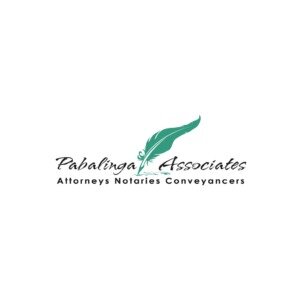Best Communications & Media Law Lawyers in Francistown
Share your needs with us, get contacted by law firms.
Free. Takes 2 min.
List of the best lawyers in Francistown, Botswana
About Communications & Media Law in Francistown, Botswana
Communications & Media Law in Francistown, Botswana encompasses regulations and legal practices related to telecommunications, broadcasting, the internet, and information dissemination. It governs how media entities operate, ensuring that content is distributed responsibly and ethically while upholding freedom of expression as stipulated in the Constitution of Botswana. This field of law is essential for maintaining the balance between public interests, media freedom, and personal privacy.
Why You May Need a Lawyer
There are numerous scenarios where legal advice in Communications & Media Law might be necessary. You may need a lawyer if you are involved in media production and face issues such as defamation claims, breach of privacy, or if you're setting up a telecommunications business and need to comply with regulatory licensing. Additionally, if any content published or broadcast might infringe on intellectual property rights or if you are facing censorship issues, consulting a legal expert would be advisable.
Local Laws Overview
In Francistown, as throughout Botswana, Communications & Media Law is subject to national legislation such as the Botswana Communications Regulatory Authority Act, which oversees the communications sector. Laws related to defamation, intellectual property, and digital content are integral, providing a framework for ethical and legal content dissemination. The Penal Code may also apply in circumstances where communications threaten public order or safety.
Frequently Asked Questions
What is freedom of expression, and how is it protected?
Freedom of expression is the right to communicate one's opinions and ideas. In Botswana, it is protected under the Constitution, but it is subject to limitations to protect public interest, security, and morality.
When can defamation claims be made?
Defamation claims can be made when false statements are published or broadcast that injure someone's reputation. Both private individuals and public figures can pursue such claims, bearing in mind the distinctions in the burden of proof.
What are the licensing requirements for broadcasters?
Broadcasting entities must obtain licenses from the Botswana Communications Regulatory Authority (BOCRA) to operate legally. Licensing ensures compliance with technical, content, and ethical standards.
How does intellectual property law affect media companies?
Intellectual property law protects creative works and ideas. Media companies must respect copyright, trademarks, and related rights to avoid legal disputes over content use and distribution.
What is the Botswana Position on internet privacy?
Internet privacy is vital for protecting user data. Laws ensure that service providers adhere to privacy norms, but ongoing developments in digital law seek to enhance safeguards against data breaches.
Can the government censor media content?
The government can restrict media content if it poses threats to national security, public order, or violates moral codes. Such actions, however, must be justified and not arbitrary to align with constitutional protections.
What role does the Botswana Communications Regulatory Authority play?
BOCRA regulates the communications sector, ensuring that services are offered fairly and ethically, protecting consumer rights, and fostering competition. It issues licenses and monitors compliance with regulations.
Are there laws governing social media use?
While specific laws on social media are evolving, current regulations address cyberbullying, fake news, and defamation to maintain responsible usage, aligning with broader communication laws.
How can individuals protect their privacy online?
Individuals should be aware of their rights under data protection regulations and use privacy settings on digital platforms. Being cautious about sharing personal information online is also vital.
What are the penalties for non-compliance with media laws?
Penalties for non-compliance range from fines to imprisonment, depending on the severity of the violation. Corporations might face license revocation or additional sanctions.
Additional Resources
Individuals seeking more information may contact the Botswana Communications Regulatory Authority (BOCRA), which provides guidance and resources. Organizations such as Media Institute of Southern Africa (MISA) Botswana and local legal aid societies can offer advice and advocacy.
Next Steps
If you need legal assistance, start by identifying specific issues you are facing and gathering relevant documentation. Consult a legal professional specializing in Communications & Media Law. You may contact local law firms in Francistown or reach out to BOCRA for guidance on licensed attorneys. Understanding your rights and obligations thoroughly can help you navigate the complexities of Communications & Media Law effectively.
Lawzana helps you find the best lawyers and law firms in Francistown through a curated and pre-screened list of qualified legal professionals. Our platform offers rankings and detailed profiles of attorneys and law firms, allowing you to compare based on practice areas, including Communications & Media Law, experience, and client feedback.
Each profile includes a description of the firm's areas of practice, client reviews, team members and partners, year of establishment, spoken languages, office locations, contact information, social media presence, and any published articles or resources. Most firms on our platform speak English and are experienced in both local and international legal matters.
Get a quote from top-rated law firms in Francistown, Botswana — quickly, securely, and without unnecessary hassle.
Disclaimer:
The information provided on this page is for general informational purposes only and does not constitute legal advice. While we strive to ensure the accuracy and relevance of the content, legal information may change over time, and interpretations of the law can vary. You should always consult with a qualified legal professional for advice specific to your situation.
We disclaim all liability for actions taken or not taken based on the content of this page. If you believe any information is incorrect or outdated, please contact us, and we will review and update it where appropriate.








